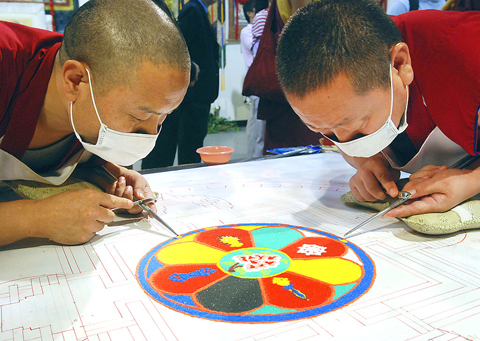A month-long special exhibition on the culture, religion, life and political system of Tibetans living in exile was inaugurated in Taipei yesterday. The exhibition commemorates the 50th anniversary of the flight of the Dalai Lama and tens of thousands of his followers into exile in India.
“In 1959, more than 80,000 Tibetan farmers and cattle drivers — most with no knowledge of living outside Tibet or in a modernized place — fled into exile in India with the Dalai Lama to escape the Chinese occupation,” Dawa Tsering, chairman of the Tibet Religious Foundation of His Holiness the Dalai Lama, told a news conference.
The foundation is the organizer of the exhibition at the National Taiwan Democracy Memorial Hall in Taipei.

PHOTO: CHIANG YING-YING, AP
After moving from one of the coldest places in the world to one of the hottest, the Tibetans had to not only quickly adapt to their new environment, but also had to start a new life from nothing, Dawa said.
Although some people had been farmers all their lives, “they had to learn about new crops and plants they had never seen before,” he said.
“Through more than 400 photographs and more than 20 documentaries — most being shown for the first time in Taiwan — we will present to visitors how Tibetan culture and religion are preserved in exile, how they live their life in exile and how Tibetan history is seen through a Tibetan perspective,” Dawa said.
Besides pictures, visitors can also see many rare objects, such as coins, banknotes and stamps issued by the Tibetan government before the Chinese occupation, as well as traditional Tibetan handicrafts, such as thangka paintings and a display of sand mandalas.
The sand mandala is a Tibetan Buddhist tradition involving the creation and destruction of a mandala made from colored sand. A sand mandala is destroyed once it has been completed in a ceremony that symbolizes the Buddhist belief in the transitory nature of material life.
The exhibition will be open until July 30, and more information can be found on the Internet at www.tibet.org.tw/50.

SHIPS, TRAINS AND AUTOMOBILES: The ministry has announced changes to varied transportation industries taking effect soon, with a number of effects for passengers Beginning next month, the post office is canceling signature upon delivery and written inquiry services for international registered small packets in accordance with the new policy of the Universal Postal Union, the Ministry of Transportation and Communications said yesterday. The new policy does not apply to packets that are to be delivered to China, the ministry said. Senders of international registered small packets would receive a NT$10 rebate on postage if the packets are sent from Jan. 1 to March 31, it added. The ministry said that three other policies are also scheduled to take effect next month. International cruise ship operators

HORROR STORIES: One victim recounted not realizing they had been stabbed and seeing people bleeding, while another recalled breaking down in tears after fleeing A man on Friday died after he tried to fight the knife-wielding suspect who went on a stabbing spree near two of Taipei’s busiest metro stations, Taipei Mayor Chiang Wan-an (蔣萬安) said. The 57-year-old man, identified by his family name, Yu (余), encountered the suspect at Exit M7 of Taipei Main Station and immediately tried to stop him, but was fatally wounded and later died, Chiang said, calling the incident “heartbreaking.” Yu’s family would receive at least NT$5 million (US$158,584) in compensation through the Taipei Rapid Transit Corp’s (TRTC) insurance coverage, he said after convening an emergency security response meeting yesterday morning. National

The Forestry and Nature Conservation Agency yesterday launched a gift box to market honey “certified by a Formosan black bear” in appreciation of a beekeeper’s amicable interaction with a honey-thieving bear. Beekeeper Chih Ming-chen (池明鎮) in January inspected his bee farm in Hualien County’s Jhuosi Township (卓溪) and found that more than 20 beehives had been destroyed and many hives were eaten, with bear droppings and paw prints near the destroyed hives, the agency said. Chih returned to the farm to move the remaining beehives away that evening when he encountered a Formosan black bear only 20m away, the agency said. The bear

PLANNED: The suspect visited the crime scene before the killings, seeking information on how to access the roof, and had extensively researched a 2014 stabbing incident The suspect in a stabbing attack that killed three people and injured 11 in Taipei on Friday had planned the assault and set fires at other locations earlier in the day, law enforcement officials said yesterday. National Police Agency (NPA) Director-General Chang Jung-hsin (張榮興) said the suspect, a 27-year-old man named Chang Wen (張文), began the attacks at 3:40pm, first setting off smoke bombs on a road, damaging cars and motorbikes. Earlier, Chang Wen set fire to a rental room where he was staying on Gongyuan Road in Zhongzheng District (中正), Chang Jung-hsin said. The suspect later threw smoke grenades near two exits